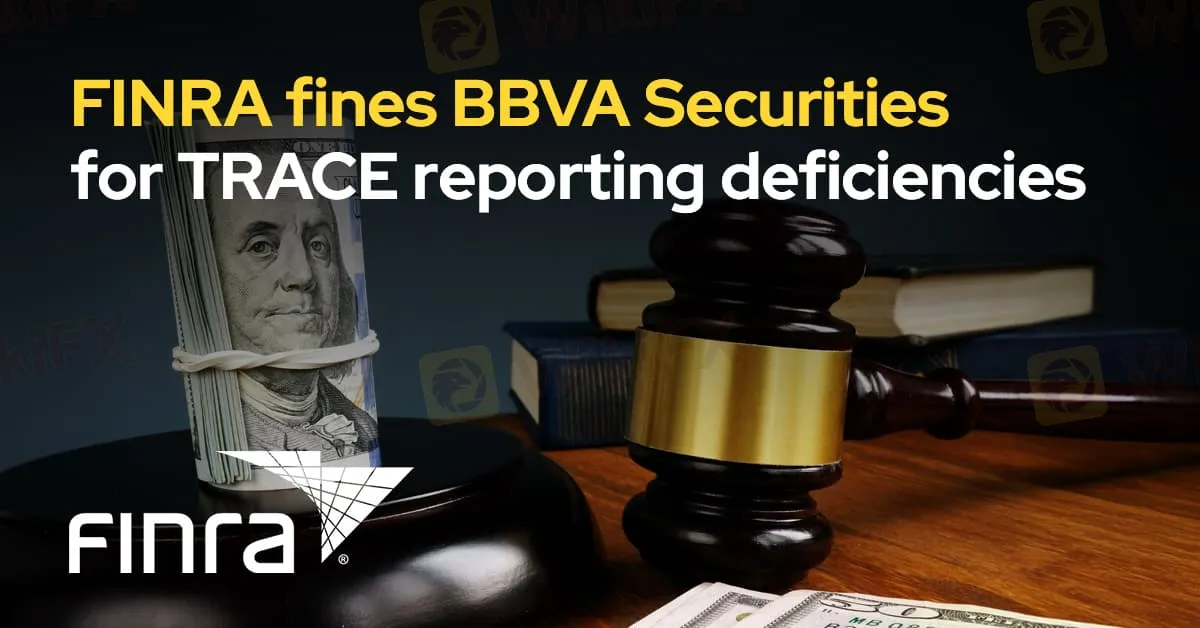简体中文
繁體中文
English
Pусский
日本語
ภาษาไทย
Tiếng Việt
Bahasa Indonesia
Español
हिन्दी
Filippiiniläinen
Français
Deutsch
Português
Türkçe
한국어
العربية
FINRA Fines BBVA Securities for TRACE Reporting Deficiencies
Abstract:BBVA Securities Inc. has been fined $175,000 by the Financial Industry Regulatory Authority (FINRA) as part of a settlement over deficiencies in its Trade Reporting and Compliance Engine (TRACE) reporting. The penalty comes after an investigation revealed significant lapses in BBVA's compliance with FINRA's reporting requirements.

BBVA Securities Inc. has been fined $175,000 by the Financial Industry Regulatory Authority (FINRA) as part of a settlement over deficiencies in its Trade Reporting and Compliance Engine (TRACE) reporting. The penalty comes after an investigation revealed significant lapses in BBVA's compliance with FINRA's reporting requirements.
Between July 2016 and January 2023, BBVA Securities failed to include a required indicator on approximately 50,000 TRACE reports. This omission was a direct violation of FINRA Rule 6730, which mandates the inclusion of specific indicators to ensure accurate and complete trade reporting.
The investigation also uncovered that BBVA Securities had not established or maintained a supervisory system adequate to ensure compliance with TRACE reporting requirements. This failure included a lack of effective written supervisory procedures designed to meet the standards outlined in FINRA Rule 6730.
Moreover, BBVA Securities did not review its TRACE reports for accuracy, which would have included verifying the presence of required indicators. This oversight resulted in violations of FINRA Rules 3110 and 2010, which mandate proper supervisory systems and adherence to regulatory requirements.
In addition to the $175,000 fine, BBVA Securities has agreed to a censure as part of the settlement. The censure serves as an official reprimand and a formal acknowledgment of the firm's regulatory shortcomings.
This settlement underscores the importance of robust supervisory systems and accurate trade reporting. FINRA's action highlights the need for financial firms to adhere strictly to reporting requirements and maintain effective compliance practices to avoid significant penalties.

Disclaimer:
The views in this article only represent the author's personal views, and do not constitute investment advice on this platform. This platform does not guarantee the accuracy, completeness and timeliness of the information in the article, and will not be liable for any loss caused by the use of or reliance on the information in the article.
Read more

CySEC reaches €20k settlement with ZFN EUROPE
According to report, the Cyprus Securities and Exchange Commission (CySEC) announced today that it has entered into a settlement agreement with ZFN EUROPE Ltd for the amount of €20,000. This settlement resolves a regulatory inquiry into ZFN Europe’s compliance with Cyprus’s Investment Services and Activities and Regulated Markets Law of 2017, as amended.

Pi Network: Scam Allegations Spark Heated Debate
A whistleblower report has surfaced, casting doubt on the legitimacy of Pi Network, alleging psychological manipulation, opaque operations, and potential financial exploitation. What is your take on this?

The Crypto Shift: Challenges and Opportunities for Traditional Brokers
Crypto exchanges are expanding into traditional asset classes like forex and commodities, blurring the lines with traditional brokers. Meanwhile, few brokers, like eToro, have successfully integrated crypto into their platforms, revealing both the opportunities and the challenges ahead.

Prop Trading Firms vs. CFD Brokers: Who’s Winning the Retail Trading Race?
In recent years, a new breed of retailer-focused trading firms has emerged: proprietary (prop) trading outfits that recruit individual traders to trade the firm’s capital under structured rules. Boasting low entry costs, clear risk parameters, and profit-sharing incentives, these prop firms are rapidly winning over retail traders, many of whom previously traded Contracts for Difference (CFDs) with established online brokers. As prop trading revenues accelerate, a key question arises: Are CFD brokers losing business to prop firms?
WikiFX Broker
Latest News
Love, Investment & Lies: Online Date Turned into a RM103,000 Scam
Broker’s Promise Turns to Loss – Funds Disappear, No Compensation!
Broker Took 10% of User's Profits – New Way to Swindle You? Beware!
Pi Network: Scam Allegations Spark Heated Debate
Broker Comparsion: FXTM vs AvaTrade
Account Deleted, Funds Gone: A New Broker Tactic to Beware Of?
El Salvador and U.S. Launch Cross-Border Crypto Regulatory Sandbox
The Instagram Promise That Stole RM33,000
StoneX Subsidiary, Gain Global Markets Bermuda, Penalized for Trading Misconduct
Kraken Partners with Alpaca to Offer U.S. Stocks and Crypto
Currency Calculator


